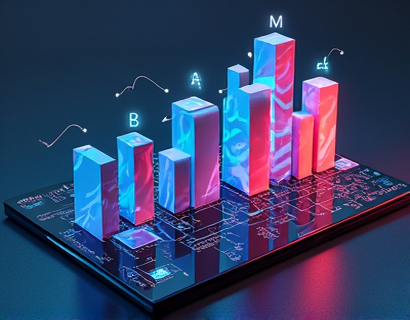Smart Contracts and Management Tools: Transforming Governance for Enhanced Democracy and Participation
The advent of smart contract technology and advanced management tools is poised to revolutionize the landscape of governance, making democratic processes more accessible, efficient, and transparent. This transformation is not merely a technological upgrade but a fundamental shift towards universal democracy and participatory governance. By leveraging the inherent properties of smart contracts and innovative management solutions, individuals and organizations can engage more deeply in the democratic process, fostering a more inclusive and responsive form of governance.
Understanding Smart Contracts in Governance
Smart contracts are self-executing contracts with the terms of the agreement directly written into code. They run on blockchain technology, ensuring transparency, immutability, and security. In the context of governance, smart contracts can automate and enforce the rules and regulations that underpin democratic processes. For instance, they can be used to manage voting systems, ensuring that votes are cast and counted accurately and transparently, with no room for tampering or fraud.
The use of smart contracts in governance extends beyond voting. They can streamline administrative tasks, such as contract management, procurement, and compliance monitoring. By automating these processes, smart contracts reduce the potential for human error and corruption, thereby enhancing the overall efficiency and integrity of government operations.
Enhancing Transparency through Blockchain
One of the most significant advantages of smart contracts is their ability to enhance transparency. Blockchain technology, which underpins smart contracts, provides a decentralized and immutable ledger that records all transactions. This means that every step of a governance process, from proposal to execution, can be tracked and verified by anyone with access to the blockchain. Such transparency builds trust among citizens and reduces the opacity that often characterizes traditional governance systems.
Transparency is crucial for democratic governance as it allows citizens to hold their leaders accountable. With smart contracts, the entire lifecycle of a governance initiative is visible, from the initial proposal to the final outcome. This visibility ensures that decisions are made in the public interest and that any deviations from the agreed-upon terms are immediately detectable and addressable.
Streamlining Decision-Making Processes
Smart contracts and management tools can significantly streamline decision-making processes in governance. Traditional decision-making often involves multiple layers of bureaucracy, lengthy deliberations, and cumbersome documentation. Smart contracts can automate many of these steps, reducing the time and resources required to reach a decision.
For example, in a municipal setting, a smart contract can be programmed to trigger specific actions based on predefined conditions. If a certain budget threshold is reached or a specific milestone is achieved, the contract can automatically initiate the next phase of a project. This automation not only speeds up the process but also minimizes the potential for delays and miscommunications.
Boosting Community Engagement
Enhanced transparency and streamlined processes are just the beginning. Smart contracts and management tools can also boost community engagement, a cornerstone of participatory governance. By providing clear and accessible information about governance processes, these tools empower citizens to participate more actively in decision-making.
Online platforms built on smart contract technology can facilitate public consultations, allowing citizens to provide input on proposed policies and projects. These platforms can also enable real-time voting on key issues, ensuring that the voices of all community members are heard and considered. This level of engagement not only enriches the decision-making process but also fosters a sense of ownership and responsibility among citizens.
Fostering Universal Democracy
The combination of smart contracts and management tools has the potential to make democracy more universal. By reducing barriers to participation and ensuring that governance processes are transparent and efficient, these technologies can make democratic systems more inclusive. This is particularly important in regions where traditional governance structures have been marred by corruption, inefficiency, or exclusionary practices.
For instance, in areas with limited access to traditional voting mechanisms, blockchain-based voting systems can provide a secure and accessible way for citizens to exercise their right to vote. Similarly, smart contract-based management tools can help local governments in developing countries implement projects more effectively, ensuring that resources are used efficiently and benefits are distributed equitably.
Challenges and Considerations
While the potential benefits of smart contracts and management tools in governance are substantial, there are also challenges and considerations that must be addressed. One of the primary concerns is the digital divide, where not all citizens have equal access to the technology required to participate in smart contract-based systems. To mitigate this, efforts must be made to ensure that technology is accessible and user-friendly for all segments of the population.
Another consideration is the need for robust legal and regulatory frameworks to govern the use of smart contracts in governance. As these technologies are relatively new, existing laws may not adequately address the unique challenges they present. Governments and organizations must work together to develop frameworks that ensure the secure, fair, and transparent use of smart contracts in governance.
Innovative Management Tools for Effective Governance
Beyond smart contracts, innovative management tools play a crucial role in transforming governance. These tools can enhance the capabilities of government agencies and organizations, making them more responsive and efficient. Some key areas where these tools can make a significant impact include data management, public service delivery, and stakeholder engagement.
Data management tools powered by blockchain and AI can help governments collect, store, and analyze data more effectively. This data can be used to inform policy decisions, monitor program outcomes, and improve public services. For example, real-time data on traffic patterns can help urban planners design more efficient transportation systems, reducing congestion and improving quality of life.
Public service delivery is another area where management tools can revolutionize governance. By leveraging digital platforms, governments can provide services more efficiently and reach a wider audience. Online portals for applying for permits, paying bills, and accessing government information can reduce bureaucratic hurdles and make services more accessible to citizens.
Case Studies and Real-World Applications
Several real-world applications demonstrate the transformative potential of smart contracts and management tools in governance. One notable example is the use of blockchain for land registry systems. In countries like Estonia and Georgia, blockchain-based land registries have significantly reduced the time and cost associated with property transactions, while also reducing the risk of fraud and corruption.
Another example is the use of smart contracts in public procurement. The city of Zug in Switzerland has implemented a blockchain-based platform for public procurement, ensuring transparency and fairness in the bidding process. This platform allows suppliers to submit bids digitally, and the smart contract automatically selects the best offer based on predefined criteria, reducing the potential for bias and corruption.
Conclusion
The integration of smart contracts and management tools into governance represents a significant step towards enhancing democracy and participation. By automating processes, enhancing transparency, and boosting community engagement, these technologies have the potential to create more inclusive and responsive governance systems. As more individuals and organizations adopt these innovations, we can expect to see a new era of collaborative decision-making and effective management, ultimately leading to a more democratic and participatory society.











































